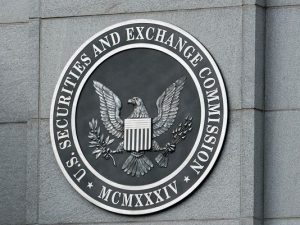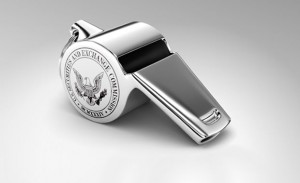 The SEC voted today to propose amendments to its SEC Whistleblower Program rules. The SEC Whistleblower Program was established in 2010 and provides that if an individual presents the SEC with original information concerning a violation of federal securities laws leading to an enforcement action that results in over $1 million in monetary sanctions, that individual is eligible to receive an award of 10% to 30% of the amount collected.
The SEC voted today to propose amendments to its SEC Whistleblower Program rules. The SEC Whistleblower Program was established in 2010 and provides that if an individual presents the SEC with original information concerning a violation of federal securities laws leading to an enforcement action that results in over $1 million in monetary sanctions, that individual is eligible to receive an award of 10% to 30% of the amount collected.
The SEC Whistleblower Program has thus far led to enforcement actions in which the Commission has ordered over $1.4 billion in financial remedies, including more than $740 million in disgorgement of ill-gotten gains and interest.
The SEC is now looking to find ways to enhance the program and is proposing the amendments stated in full below. SEC Chairman Jay Clayton stated on record that the intent is to “strengthen the whistleblower program by bolstering the Commission’s ability to more appropriately and expeditiously reward those who provide critical information that leads to successful enforcement actions.”

Photo Credit: SEC
Some of the major amendments that appear to be good news for SEC whistleblowers include allowing awards based on deferred prosecution agreements rather than only enforcement actions and providing more discretion to increase awards of less than $2 million, since more than 60% of the awards are in that range and the SEC wants to encourage more credible tips. The one major amendment that appears to be very concerning is the proposed cap of $30 million on any whistleblower award. This cap may deter the highest-ranking officials of major corporations from reporting the biggest types of fraud. Uncapped awards provide incentives for even the highest-earning executives to report fraud.
There will be a public comment period for 60 days after publication of the proposals in the Federal Register. Hopefully, the proposals will only strengthen the program, which is an important tool in the fight against fraud, and not deter would-be whistleblowers from coming forward.
A fact sheet on the proposals from the SEC is copied in full below.
FACT SHEET
SEC Open Meeting
June 28, 2018
Background
Section 922 of the Dodd-Frank Wall Street Reform and Consumer Protection Act added Section 21F to the Securities Exchange Act of 1934 (the “Exchange Act”), establishing the Commission’s whistleblower program. Among other things, Section 21F authorizes the SEC to make monetary awards to eligible individuals who voluntarily provide original information that leads to successful SEC enforcement actions resulting in monetary sanctions over $1 million and successful related actions. Awards must be made in an amount equal to 10 to 30 percent of the monetary sanctions collected. Congress established a separate fund at the Treasury Department, called the Investor Protection Fund (IPF), from which whistleblower awards are paid. Since the program’s inception, the Commission has ordered over $266 million in 50 awards to 55 whistleblowers, including individuals filing jointly, whose information and cooperation assisted the Commission in bringing successful enforcement actions.
The proposed whistleblower rule amendments would make certain modifications and clarifications to the existing rules, as well as several technical amendments.
Highlights
Additional Tools in Award Determinations
- Allowing awards based on deferred prosecution agreements (“DPAs”) and non-prosecution agreements (“NPAs”) entered into by the U.S. Department of Justice (“DOJ”) or a state attorney general in a criminal case, or a settlement agreement entered into by the Commission outside of the context of a judicial or administrative proceeding to address violations of the securities laws: This proposed amendment will ensure that whistleblowers are not disadvantaged because of the particular form of an action that the Commission, DOJ, or a state attorney general acting in a criminal case may elect to pursue. Currently, the Commission’s whistleblower rules do not address whether the Commission may pay a related-action award when an eligible whistleblower voluntarily provides original information that leads to a DPA or NPA entered into by DOJ or a state attorney general in a criminal proceeding. Under the proposed amendment, the Commission would be able to make award payments to whistleblowers based on money collected as a result of such DPAs and NPAs, as well as under settlement agreements entered into by the Commission outside of the context of a judicial or administrative proceeding to address violations of the securities laws.
- Additional considerations for small and exceedingly large awards:
- Historically, over 60% of the awards given out in our whistleblower program have been less than $2 million. In the context of potential awards that could yield a payout of less than $2 million to a whistleblower, the proposed rules would authorize the Commission in its discretion to adjust the award percentage upward under certain circumstances (subject to the 30% statutory maximum) to an amount up to $2 million. In exercising its discretion to increase an award under this provision, the Commission would consider whether the increase helps to better achieve the program’s objectives of rewarding meritorious whistleblowers and sufficiently incentivizing future whistleblowers who might otherwise be concerned about the low dollar amount of a potential award.
- The proposing release also includes a general inquiry for public comment regarding whether the Commission could establish a potential discretionary award mechanism for Commission enforcement actions that do not qualify as covered actions (because they do not meet the more than $1 million threshold requirement), are based on publicly available information, or where the monetary sanctions collected are de minimis.
- Forty percent of the aggregate funds paid by the Commission to whistleblowers have been paid out in only three awards.[1] In the context of potential awards that could yield total collected monetary sanctions of at least $100 million, the proposed rules would authorize the Commission in its discretion to adjust the award percentage so that it would yield a payout (subject to the 10% statutory minimum) that does not exceed an amount that is reasonably necessary to reward the whistleblower and to incentivize other similarly situated whistleblowers. However, in no event would the award be adjusted below $30 million. This proposed amendment is intended to make sure that the Commission is a responsible steward of the public trust while continuing to provide strong whistleblower incentives.
- Elimination of potential double recovery under the current definition of “related action”: This proposed amendment would prevent the irrational result that could occur if a whistleblower could receive multiple recoveries for the same information from different whistleblower programs. The proposed amendment would clarify that a law-enforcement or separate regulatory action would not qualify as a “related action” if the Commission determines that there is a separate whistleblower award scheme that more appropriately applies to the enforcement action.
Uniform Definition of “Whistleblower”
In addition to the foregoing recommendations, the Commission proposes rule amendments in response to the Supreme Court’s recent decision in Digital Realty Trust, Inc. v. Somers. In that decision, the Court held that the whistleblower provisions of the Exchange Act require that a person report a possible securities law violation to the Commission in order to qualify for protection against employment retaliation under Section 21F. The Court thus invalidated the Commission’s rule interpreting Section 21F’s anti-retaliation protections to apply in cases of internal reports.
The proposed rules would modify Rule 21F-2 so that it comports with the Court’s holding by, among other things, establishing a uniform definition of “whistleblower” that would apply to all aspects of Exchange Act Section 21F—i.e., the award program, the heightened confidentiality requirements, and the employment anti-retaliation protections. For purposes of retaliation protection, an individual would be required to report information about possible securities laws violations to the Commission “in writing”. To be eligible for an award or to obtain heightened confidentiality protection, the additional existing requirement that a whistleblower submit information on Form TCR or through the Commission’s online tips portal would remain in place.
Increased Efficiency in Claims Review Process
Two further proposed changes are designed to help increase the Commission’s efficiency in processing whistleblower award applications.
- Proposed new subparagraph (e) to Exchange Act Rule 21F-8 would clarify the Commission’s ability to bar individuals from submitting whistleblower award applications where they are found to have submitted false information to the Commission, as well as to afford the Commission with the ability to bar individuals who repeatedly make frivolous award claims in Commission actions. To prevent repeat submitters from abusing the award application process, the proposed rule would permit the Commission to permanently bar any applicant from seeking an award after the Commission determines that the applicant has abused the process by submitting three frivolous award applications.
- Proposed new Exchange Act Rule 21F-18 would afford the Commission with a summary disposition procedure for certain types of likely denials, such as untimely award applications, applications that involve a tip that was not provided to the Commission in the form and manner that the rules require, and applications where the claimant’s information was never provided to or used by staff responsible for the investigation. The proposed summary disposition procedures would help facilitate a more timely resolution of such relatively straightforward denials, while freeing up staff resources to focus on processing potentially meritorious award claims. As under current rules, Claimants would have an opportunity to contest a preliminary denial of their claim before the Commission makes its final determination.
Clarification and Enhancement of Certain Policies and Procedures
The proposed amendments would clarify and enhance certain policies, practices, and procedures in implementing the program. These recommendations include the items listed below.
- Proposed revisions to Exchange Act Rule 21F-4(e) to clarify the definition of “monetary sanctions” so that it codifies the Commission’s current understanding and application of that term.
- Proposed revisions to Exchange Act Rule 21F-9 to provide the Commission with additional flexibility to modify the manner in which individuals may submit Form TCR (Tip, Complaint or Referral).
- Proposed revisions to Exchange Act Rule 21F-8 to provide the Commission with additional flexibility regarding the forms used in connection with the whistleblower program.
- Proposed amendment to Exchange Act Rule 21F-12 to clarify the list of materials that the Commission may rely upon in making an award determination.
- Proposed amendment to Rule 21F-13 to clarify the materials that may comprise the administrative record for purposes of judicial review.
Interpretive Guidance
In addition to the foregoing proposed rule amendments, the Commission is publishing proposed interpretive guidance to help clarify the meaning of “independent analysis” as that term is defined in Exchange Act Rule 21F-4 and utilized in award applications. Under the proposed guidance, in order to qualify as “independent analysis,” a whistleblower’s submission must provide evaluation, assessment, or insight beyond what would be reasonably apparent to the Commission from publicly available information.
What’s Next?
The proposal seeks public comment and data on a broad range of issues relating to the whistleblower program. After careful review of the comments, the Commission will consider what further action to take on the proposal.


